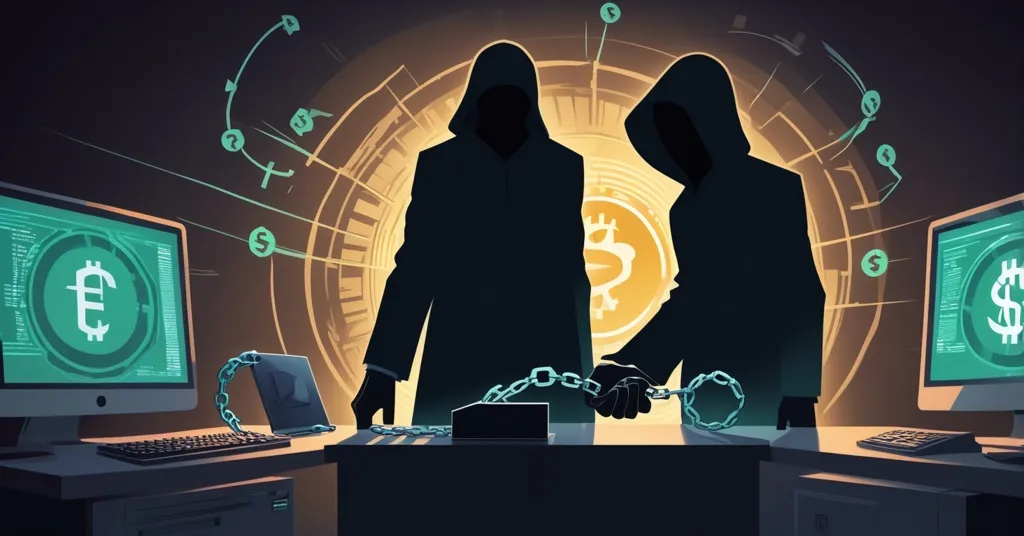U.S. Secret Service Busts Garantex: $96B Crypto Exchange Linked to Crime

Secret Service Cracks Down on Alleged Money Laundering Crypto Exchange Garantex
Did you know that a single crypto exchange can process over $96 billion in transactions while facilitating criminal activities? The U.S. Secret Service has initiated a major operation against Garantex, a Russian crypto exchange accused of being a hub for laundering dirty money, resulting in arrests, seizures, and the suspension of its operations.
- Garantex accused of facilitating criminal proceeds
- Operators Serda and Besciokov face money laundering charges
- Besciokov arrested in India, $26 million seized
- International cooperation leads to server seizures
- Garantex operations suspended after Tether intervention
Garantex, a Russian-based crypto exchange, has been under scrutiny for allegedly allowing hundreds of millions of dollars in criminal proceeds to flow through its platform. The U.S. Department of Justice’s indictment accuses Garantex of being involved in serious crimes, including drug trafficking, hacking, terrorism financing, and ransomware. Since April 2019, Garantex has processed at least $96 billion in cryptocurrency transactions, highlighting the scale of its operations.
At the center of this operation are Aleksandr Mira Serda, Garantex’s co-founder and Chief Commercial Officer, and Aleksej Besciokov, the primary technical administrator. Both face charges of conspiracy to commit money laundering, which could lead to up to 20 years in prison. Besciokov, who was arrested in India, also faces charges of violating the International Economic Emergency Powers Act (a U.S. law that allows the government to restrict trade under certain conditions) and operating an unlicensed money-transmitting business, with potential additional penalties of up to 20 and 5 years, respectively.
On March 6, 2025, the U.S. Secret Service took decisive action, seizing three of Garantex’s website domains—Garantex.org, Garantex.io, and Garantex.academy—and freezing $26 million in funds. This was complemented by international efforts, with Finnish and German authorities seizing servers linked to Garantex, showcasing the global reach of law enforcement in combating crypto-related crimes.
The final blow to Garantex came when Tether, the stablecoin issuer, blocked Garantex’s platform wallets containing about $28 million in USDT, leading to the suspension of the exchange’s operations. This move by Tether, along with assistance from blockchain analytics firm Elliptic, underscores the significant role private sector entities can play in the fight against crypto-related crimes.
This crackdown on Garantex reflects a broader trend of increasing regulatory scrutiny on cryptocurrency exchanges suspected of facilitating illegal activities. It’s a reminder that while cryptocurrencies offer unprecedented freedom and potential, they also come with significant risks. The involvement of multiple countries in this operation highlights the challenges of policing a borderless financial system.
From a bitcoin maximalist perspective, this situation reaffirms the importance of Bitcoin’s decentralized nature, which can bypass the vulnerabilities inherent in centralized exchanges like Garantex. However, it also underscores the need for vigilance and robust security measures across all crypto platforms, whether they deal in Bitcoin, Ethereum, or other altcoins.
In the spirit of effective accelerationism (e/acc), which pushes for rapid technological advancement, this crackdown can be seen as a necessary disruption to the status quo, driving the industry towards greater transparency and accountability. Yet, as suggested by Russian lawmaker Anton Gorelkin, who accused Western countries of pursuing political goals through these actions, such crackdowns can also be viewed as part of a broader geopolitical strategy. This highlights the complex interplay between technological innovation, legal enforcement, and international politics.
As we navigate this complex landscape, it’s essential to stay informed and critical. While the potential of blockchain and crypto to revolutionize finance is undeniable, so too are the challenges and risks that come with it. This operation against Garantex is a stark reminder of the dark side of crypto, but it’s also an opportunity for the industry to grow and improve.
Key Questions and Takeaways
- What crimes were facilitated by Garantex?
Garantex facilitated money laundering linked to hacking, ransomware, terrorism, and drug trafficking.
- How did Garantex evade U.S. sanctions?
Garantex moved its operational cryptocurrency wallets to different virtual currency addresses daily to evade U.S. sanctions.
- What was the scale of Garantex’s operations?
Since April 2019, Garantex processed at least $96 billion in cryptocurrency transactions.
- What role did private sector entities play in the investigation?
Tether and blockchain analytics firm Elliptic provided proactive assistance in the investigation against Garantex.
- How can potential victims of Garantex’s activities seek help?
Potential victims can contact the U.S. Secret Service at [email protected] for assistance regarding their funds.



